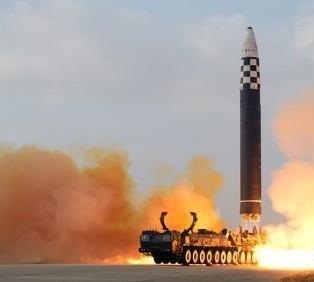Seoul, Dec 18 (IANS) North Korea fired two medium-range ballistic missiles (MRBM) into the East Sea on Sunday, the South Korean military said, the latest in a series of launches that raised tensions on the Korean Peninsula. The Joint Chiefs of Staff (JCS) said that it detected the launches from the Tongchang-ri area, North Pyongan Province, between 11:13 a.m. and 12:05 p.m. The missiles, fired at steep angles, flew some 500 kilometers, it added. The intelligence authorities of the South and the US are conducting an analysis for other details in a comprehensive consideration of the North's recent missile activities, Yonhap News Agency reported quoting the JCS. Tongchang-ri is home to a major rocket launch site. There, the North conducted an "important" test on a "high-thrust solid-fuel" motor on Thursday to develop "another new-type strategic weapon system," according to its official Korean Central News Agency. The latest saber-rattling came a month after the North fired an intercontinental ballistic missile (ICBM) thought to be capable of reaching the whole of the continental US. The JCS denounced the launches as an act of "significant provocation" that undermines peace and stability not only on the Korean Peninsula but also in the international community, and a "clear" breach of UN Security Council resolutions. "We strongly condemned them and urge the North to immediately stop them," it said in a text message sent to reporters. It added the South Korean military will maintain a solid readiness posture based on its capabilities to respond "overwhelmingly" to any North Korean provocations. National Security Adviser Kim Sung-han presided over a National Security Council (NSC) meeting at the presidential office in Seoul. "NSC officials took note of North Korea's test of solid fuel," deputy presidential spokesperson Lee Jae-myoung said. "They denounced the continued provocations by the Kim Jong-un regime in complete disregard of their people's suffering." The officials also said North Korea will pay the price for its action and South Korea, based on its strong alliance with the United States, will protect its own people while also bolstering security cooperation with the US and Japan. Seoul's chief nuclear negotiator, Kim Gunn, held phone talks with his US and Japanese counterparts, Sung Kim and Takehiro Funakoshi, respectively, to discuss the latest launches and response measures, according to the foreign ministry. The top nuclear envoys condemned the North's provocations and stressed the importance of a stern international response, pledging to bolster bilateral and trilateral cooperation over the issue. Seoul and Washington's top nuclear envoys also agreed to prepare against the possibility of additional provocations by North Korea while firmly maintaining their combined defense posture, the ministry said. Park Won-gon, professor of North Korean studies at Ewha Womans University, raised the possibility that the weekend firings could be in line with Pyongyang's drive to develop a wide range of solid-fuel missiles, including MRBMs and ICBMs. The North has been pushing to secure solid-fuel delivery vehicles that can carry heavier warheads and require less launch preparation time than liquid-fuel ones that need more time for fuel injection and other procedures. "The technical motive aside, the North might also have a political purpose to highlight its presence and capabilities in a way that makes denuclearisation an unrealistic goal," he said. Sunday's launch followed the North's commemoration on the previous day of the 11th anniversary of the death of Kim Jong-il, the former leader and father of current leader Kim Jong-un. The latest launch could be Pyongyang's reaction to last week's passage of a UN resolution calling for global efforts to improve human rights conditions in the North, some observers said. On Friday, Japan's Cabinet also endorsed a key security document that embraced "counterstrike capability" that would pave the way for the country to launch a counterattack should it and its ally, the US, come under attack, possibly from the North. This year, the North has fired more than 60 ballistic missiles, marking a single-year record.
N. Korea fires 2 medium-range ballistic missiles into East Sea: S. Korea military
- by Rinku
- December 19, 2022 2 minutes

North Korea fires an intercontinental ballistic missile, in this file photo released by its state media on Nov. 19, 2022.(Yonhap/IANS)











